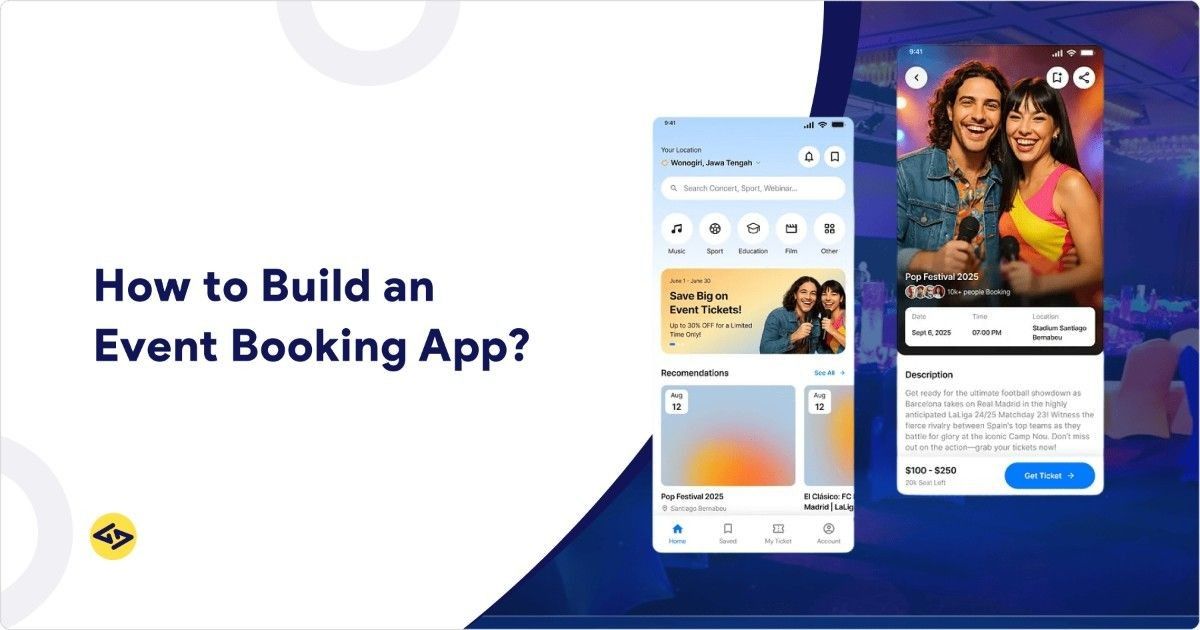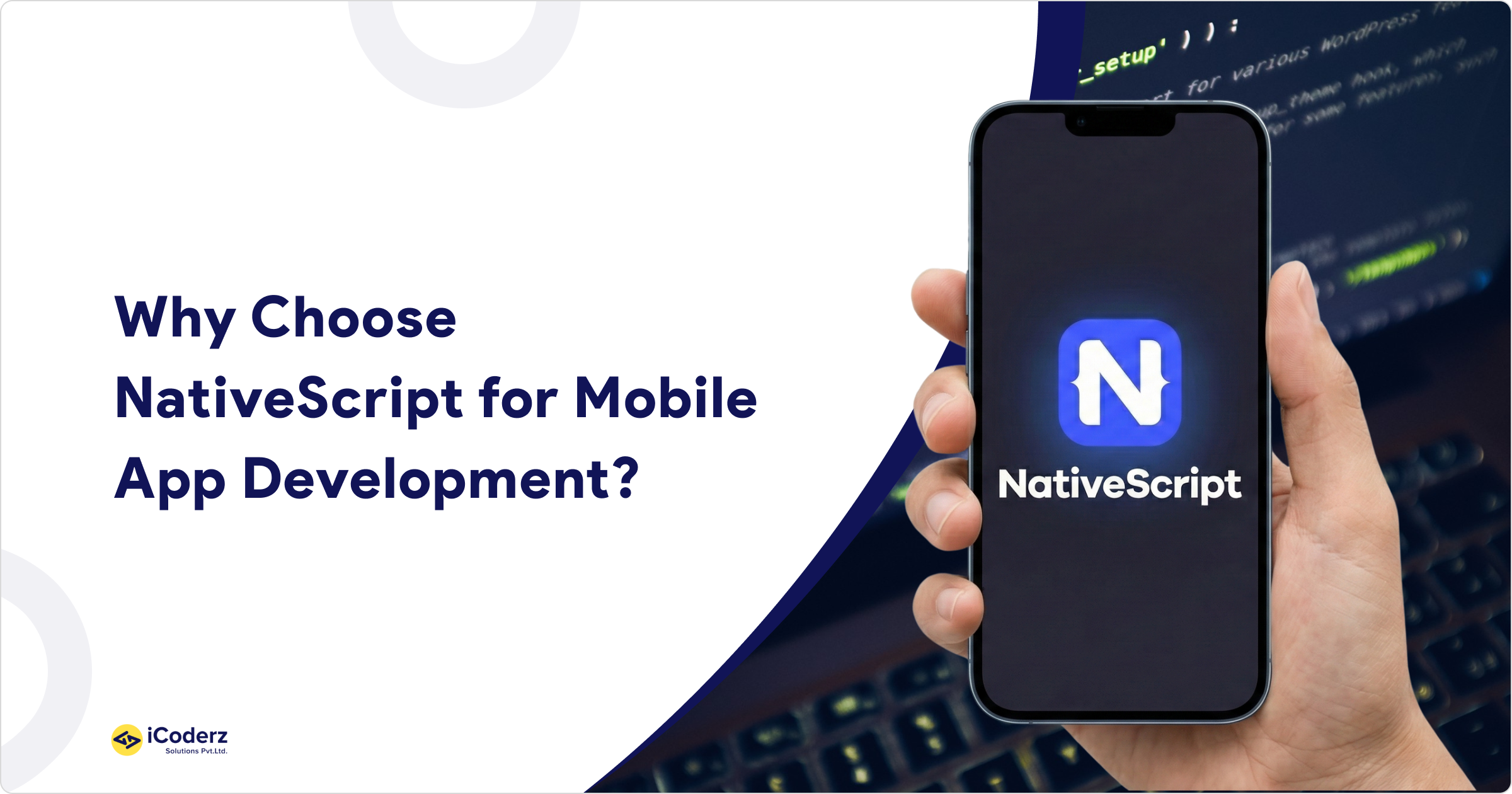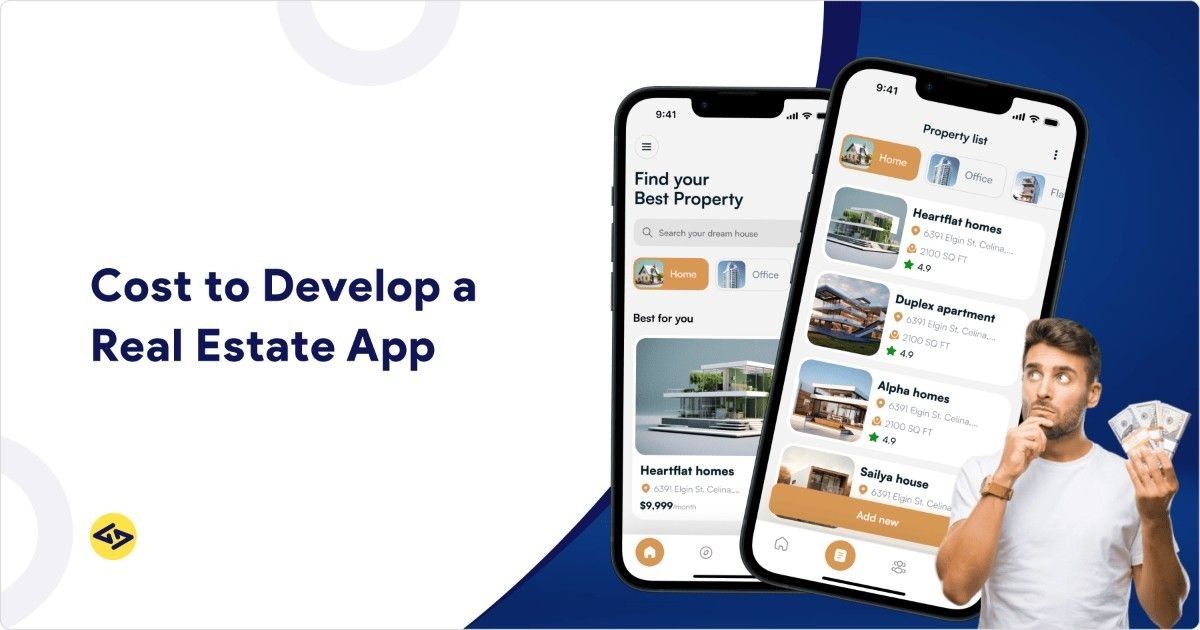What Happens When Events Go Smart? Let’s Find Out.
Think back to the last event you attended without an app. You stood in a long line. You fumbled through emails to find your ticket. You missed a session because the schedule changed, and no one informed you.
Now, imagine the same event with a smart event booking app. No lines—just a quick QR scan. Your schedule is synced to your phone. Session updates come through instant notifications. The venue map? Just one tap away. It’s smooth, simple, and stress-free—for you and everyone else.
Nowadays, events are not merely meetings. They’re opportunities to connect, inspire, and create lasting impact. That’s why delivering a seamless experience matters more than ever.
The global event management software market is projected to reach $14.1 billion by 2029, growing at a CAGR of 11.6% from 2023 to 2029. This highlights the rising demand for digital solutions that simplify planning and elevate the attendee experience.
In this blog, we’ll explore:
- The essential features every event booking app needs
- How to Build an Event App?
- What does it cost to build one?
- Advantages to organisers and attendees
- The future trends of event management software development
Are you ready to make moments into milestones? This guide is your beginning.
What are the Benefits of an Event Booking App?
Investing in powerful event app solutions transforms the event experience. It has significant organizational and user advantages.
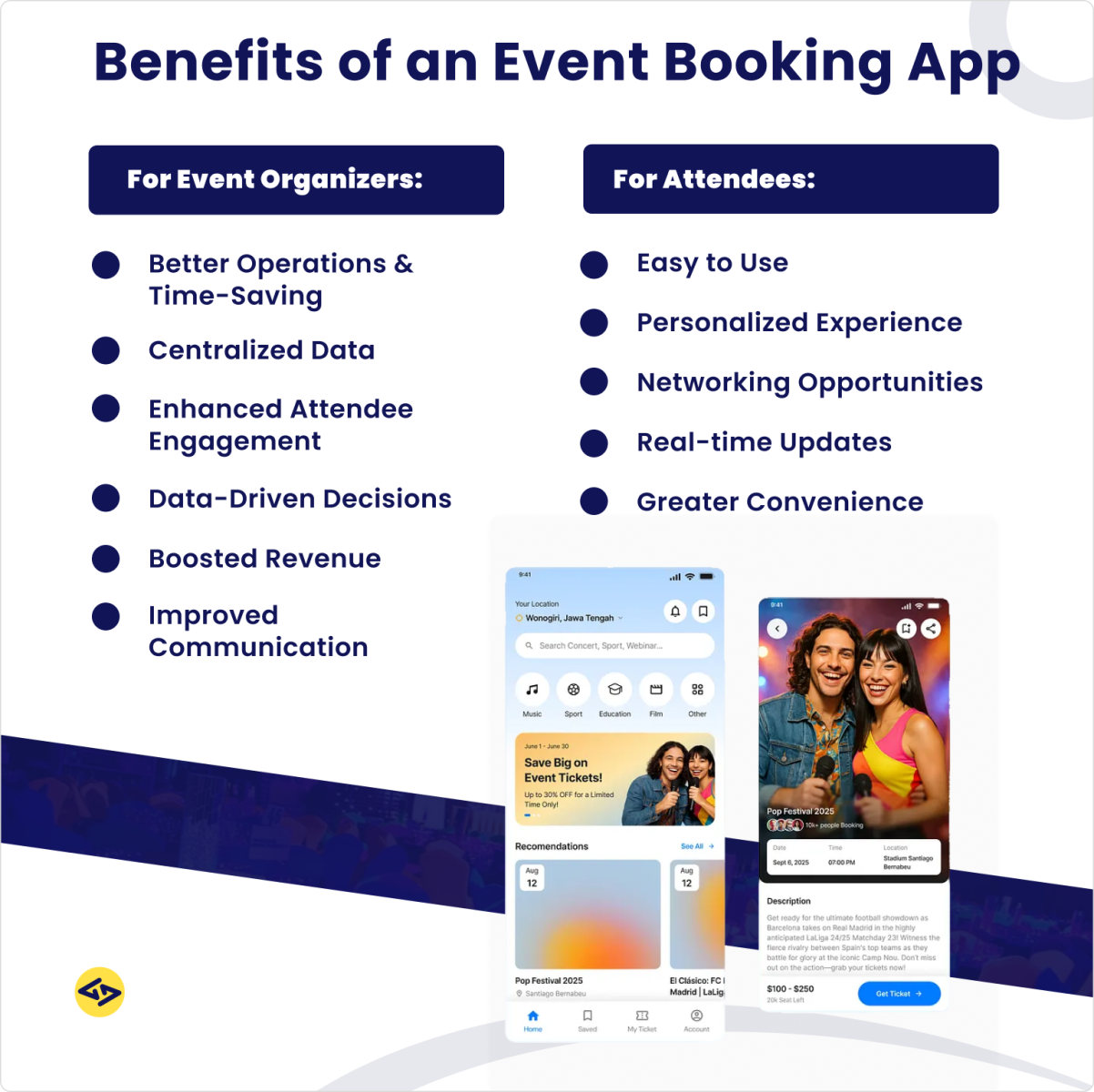
For Event Organizers
- Better Operations and Time-Saving: Automates registration, ticketing, and attendee management to reduce manual tasks.
- Centralized Data: Consolidates all event information in one place, minimizing errors and streamlining workflows.
- Enhanced Attendee Engagement: Uses interactive tools and real-time reporting to keep attendees actively involved throughout the event.
- Data-Driven Decisions: Provides data and statistics about how people act to plan future events intelligently.
- Boosted Revenue: Simplifies ticket sales, reduces printing and on-site staffing costs, and supports sponsorship opportunities.
- Improved Communication: Can push notifications and in-app messages to communicate well.
For Attendees:
- Easy to Use: Provides quick access to schedules, event details, and digital tickets—all in one place.
- Personalized Experience: Offers tailored content and reminders based on attendee preferences and event selections.
- Networking Opportunities: Includes features that enable interaction with fellow attendees, speakers, and exhibitors.
- Real-time Updates: Notifies the attendees in real-time to update them about the session, updates, or announcements.
- Greater Convenience: Enables faster check-ins and helps attendees navigate the venue easily, leading to a smoother and more enjoyable event experience.
Key Features of an Event Booking App
When it comes to building intuitive and high-performing event app features, some elements are essential for delivering a seamless user experience.
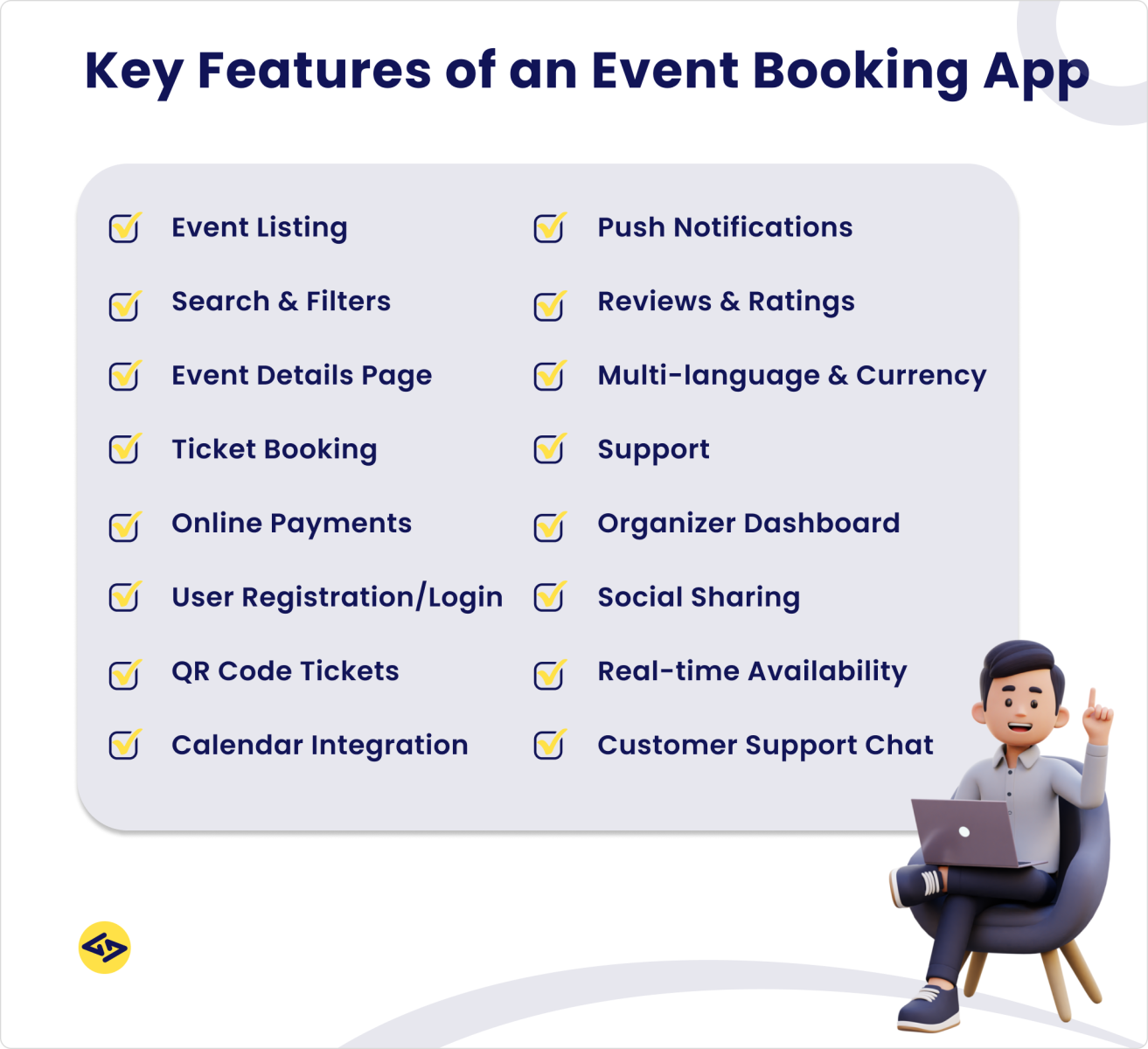
- Event Listing: Displays all available events with key details like name, date, time, and location. Helps users easily explore and choose events.
- Search & Filters: Allows users to quickly find events using keywords and apply filters by category, date, location, or price. Speeds up the discovery process.
- Event Details Page: Provides detailed information about each event, including description, schedule, venue map, speakers, and ticket options. Helps users make informed decisions.
- Ticket Booking: Let users select ticket types (e.g., VIP, early bird), choose quantities, and confirm bookings. Some events may offer seat selection via interactive maps. This is a crucial feature in ticketing app development. This is crucial for ticketing app development.
- Online Payments: Supports secure transactions through cards, UPI, wallets, or net banking. Makes payment processing rapid, safe, and certain.
- User Registration/Login: Users can register or log in with email, phone, or social media. It allows custom functions such as booking history and favorited events. This is core to any event registration app development.
- QR Code Tickets: After booking, users get a digital ticket with a QR code. The event scans this code to enter quickly and without contact.
- Calendar Integration: Allows users to add the event to their phone calendar, helping them stay reminded and avoid missing it.
- Push Notifications: Inform users about new events, and ticks, changes, and promotions. It increases retention and participation.
- Reviews & Ratings: Attendees are free to review and give feedback. Such reviews can guide prospective users to select quality experiences and develop credibility towards the app.
- Multi-language & Currency Support: Adjusts content and pricing based on the user’s region. Offers a localized experience for global users.
- Organizer Dashboard: Event hosts can manage listings, ticket sales, attendee data, and promotions from a central panel. Simplifies event management software development.
- Social Sharing: Users can share events with friends via platforms like WhatsApp, Facebook, or Instagram. Helps boost event visibility and app reach.
- Real-time Availability: Displays up-to-date ticket availability. Sends alerts when tickets are low to encourage quicker bookings.
- Customer Support Chat: In-app support helps users resolve queries about bookings, payments, or event details. Enhances user trust and satisfaction.
How to Build an Event Booking App: A Step-by-Step Guide
Building an event app involves several stages, from initial concept to deployment and ongoing maintenance. Here’s a comprehensive breakdown of each step:
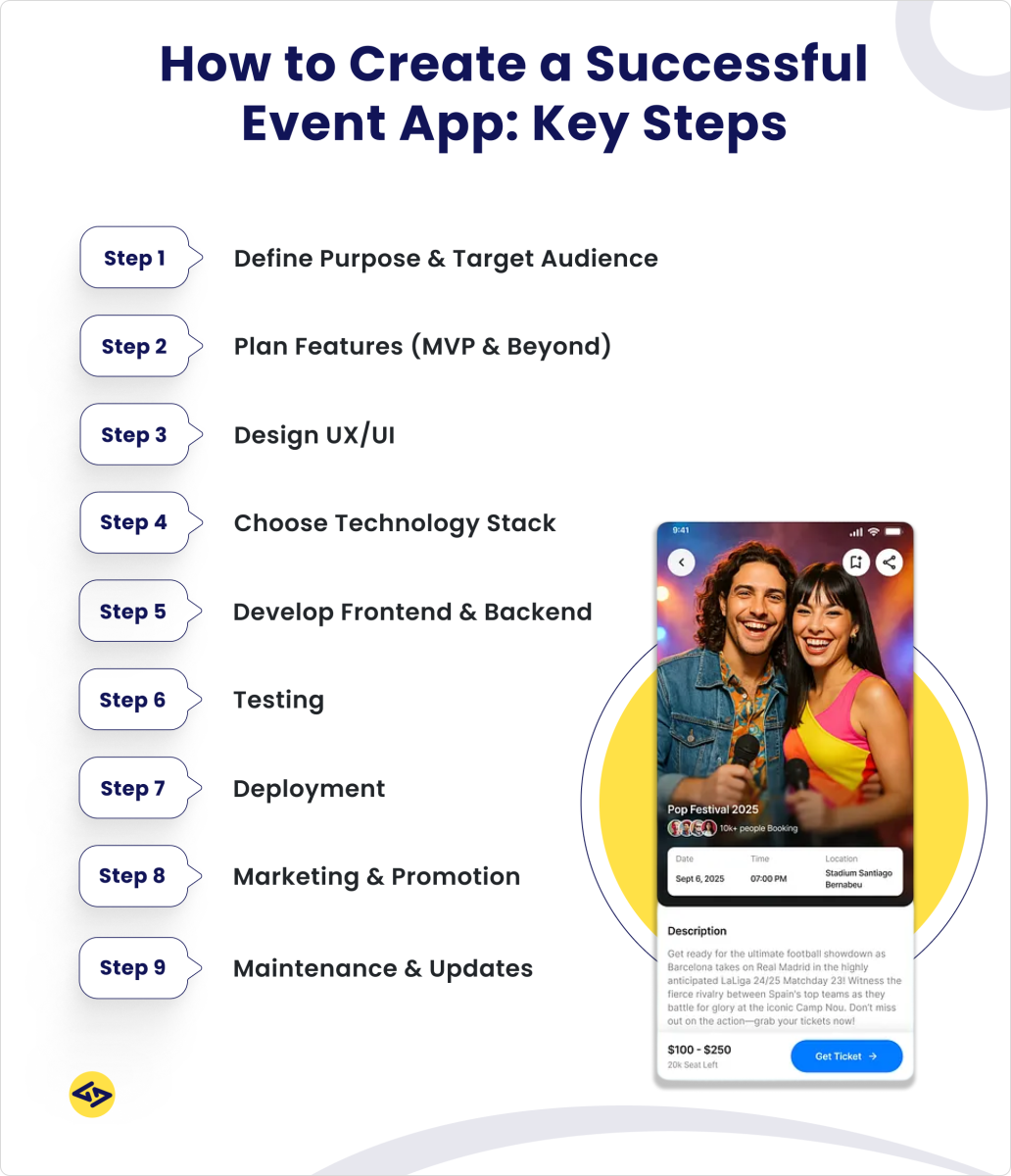
Step 1: Define Your App’s Purpose and Target Audience
To define event app goals, consider what problem your app will solve and who will be using it. It might be making event registration easier, more networking, or live updates. Then, determine the category of the events that you want to target (whether it is conferences, concerts, or weddings) because this will shape the features you will require. Be aware of your target users, be they professionals or casual attendees, and research your competition to know what is working and what is not. Lastly, create a list of all possible features, not filtering them yet. Such preliminary work is vital in successful event booking app development.
Step 2: Plan Your Features (Feature Set Definition)
Time to focus on your event application features. Divide them into 3 categories: must-have (MVP), should-have, and nice-to-have. User registration, event catalog, event schedules, speaker information, networking, maps, notifications, surveys, and administration are some of the most common features in event apps. Defining your feature set at an early stage initially targets low-level features. For instance, conference app development might prioritize speaker bios and session tracking.
Step 3: Design the UX and UI
Use a design wireframe to organize the layout and the flow of your application. This helps to diagram the way users would move through each screen. With the help of Figma or Adobe XD, build clickable prototypes (simulating the app experience) to have feedback. Then apply colors, fonts, and icons, imagery that fit your brand. And also, remember to design following a mobile-first strategy, prioritising accessibility and responsiveness. This is a crucial stage in the event booking application design.
Step 4: Choose Your Technology Stack
Pick tools based on your budget, timeline, and goals. Choose native (Swift/Kotlin) or cross-platform (Flutter/React Native) for mobile apps. Use Node.js, Django, or Laravel for the backend, and PostgreSQL or MongoDB for databases. Select a cloud provider like AWS, GCP, or Azure. Define your API architecture (how app parts connect), set up version control, and pick collaboration tools. This determines your event app technology.
Step 5: Development (Frontend and Backend)
Start coding with the development environment. Figure out your database structure, make APIs, authenticate, and perform business logic on the backend. On the frontend, turn your UI design into interactive screens, integrate APIs, and manage state. Include offline functionality or introduce push notifications. Ensure there is smooth interaction between the frontend and backend.
Step 6: Testing
Intense testing guarantees a robust application. Test each single feature with unit tests and intersystem connections with integration tests. Run tests of the overall functionality, performance, and security of the app. Do compatibility and usability testing using actual devices. It must be user acceptance tested (UAT)–put the app in the hands of real users to identify whatever was missed and confirm the experience.
Step 7: Deployment
Get ready to launch your app by creating app store developer accounts and satisfying developer requirements before submitting. Write catchy store listings with screenshots and descriptions. To deploy the backend, host your servers and database in the cloud, and apply CI/CD pipelines to access updates more easily. When ready, submit the app to stores or deploy your PWA to your website.
Step 8: Marketing & Promotion
You can develop the app, but the hard part is getting the people to use it. Make your app store listing (ASO) optimized and visible with the use of keywords and imagery. Market your app through online services such as social networking, email marketing, blogs, and advertising. Partner with event organizers or influencers to increase your reach. Market the app throughout your event marketing material to improve adoption.
Step 9: Maintenance & Updates
Maintenance is required after launch. Track the performance of the apps and correct bugs. Improve features by updating releases in order to support new devices or OS versions. Maintain security systems and proper backend operations. Lastly, ensure timely assistance to users and also solicit customer input on improvements.
Crucial Considerations for Building an Event App
- Scalability & Performance: Your app should perform reliably whether it’s used for a small workshop or a large-scale virtual conference. Using efficient code and a scalable cloud infrastructure ensures smooth performance, even under heavy user loads. This is especially vital when working on virtual event platform development, where real-time access and stability are non-negotiable.
- Intuitive UI/UX: A clean and easy-to-navigate interface improves user experience. The design should reflect your event’s brand and keep users engaged.
- Hybrid Event Support: Support both virtual and in-person interactions. Include features like live streaming, virtual networking, and venue maps for a seamless experience.
- Strong Security: Protect user data with encryption, two-factor authentication, and compliance with data privacy laws like GDPR.
Cost Factors for Event App Development
The event app development cost can vary widely depending on the complexity, features, and the location of the development team. Here’s a breakdown of common pricing tiers and what they typically include:
Basic Event App ($10K–$30K):
Offers core features such as event listings, user registration, and simple push notifications.
Use Case: Local meetups, small business events, or internal company functions.
Mid-Level App ($30K–$70K):
Adds more advanced features like in-app payments, detailed event schedules, speaker profiles, and enhanced attendee engagement tools.
Use Case: Mid-size conferences, expos, and corporate seminars.
High-End Custom App ($70K+):
Includes real-time analytics, AI-based networking, AR experiences, multi-language support, and custom branding for larger-scale global events.
Use Case: International trade shows, music festivals, or government-led summits.
Other Key Factors Influencing Cost:
- Design complexity (custom UI/UX vs. template-based)
- Platform choice (iOS, Android, Web, or all three)
- Backend infrastructure (third-party integrations, cloud hosting)
- Maintenance & updates post-launch
Conclusion: Turning Ideas into Event Experiences
An event application is more than just a tool—it’s the digital gateway to the success of your event.
In this blog, you’ve explored:
- Key features of a high-performing event app
- Strategic considerations for user engagement
- Development process insights
- Factors influencing the overall cost
When you’re ready to create more than just another app—something that delivers real value and elevates every moment—iCoderz is the team to make it happen.
Let’s craft an event experience your users will never forget. Contact us today!
Ready to build your event booking app?
Let’s turn your idea into a powerful solution today.

